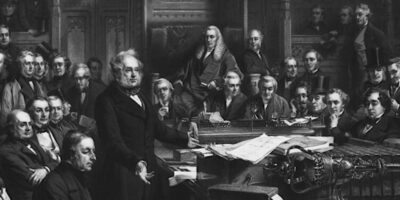Trade Retaliation Hurts Everyone
Let’s consider the problem of unfair trade practices abroad and the demand for retaliation in the form of import restrictions at home.
Here is one proposed analogy.
The atmosphere in the stadium before the big football game is thick with anticipation of a titanic struggle. Fans cheer as both teams run confidently onto the field. The field itself is well-groomed, its gridiron pattern sharp and vivid, and its angle … tilted.
Yes, tilted. The field isn’t level. One end of the field is several feet higher than the other end.
Upon winning the pre-game coin flip, the visiting team understandably chooses to defend the goal line at the high end of the field. For the entire game, whenever the home team has the ball it will struggle to move the football uphill toward the visiting team’s elevated goal line.
In contrast, the visiting team, when it has the ball, will easily run, pass, and kick the ball downhill.
A football game played on an uneven playing field would be a farce. The team defending the goal line on the high end of the field would enjoy an unfair advantage over its opponent. That team would almost certainly win the game. But neither that team nor its fans could take pride in the victory. For the same reason, the losing team and its fans would suffer only anger rather than humiliation or disappointment.
Sports writers and sports gamblers would know that both the score and the statistics of the game reflect almost nothing about the teams’ abilities and effort. The score and statistics, corrupted by the field’s tilt, would be meaningless.
Obviously, a fair and meaningful outcome of a football game requires that the playing field be level.
The same is true for trade. The process of trade, no less than the playing of a football game, should be fair — which is why each government should remove all trade barriers regardless of the actions of other governments.
Trade Is Not a Sporting Event
Nearly all protectionists today express support for free trade. But there’s always a “but,” as in “but it must also be fair trade.” Appearing to be an unobjectionable qualification to the case for free trade, such a “but” is in fact not only a wholesale rejection of the case for free trade, it is also a stealthy endorsement of unfair trade.
Protectionists typically pull off this deception by inappropriately using the metaphor of the level playing field. Protectionists assume that, just as a football game is played ultimately for the benefit of the players and for the pride of each team’s fans, economic competition is carried out ultimately for the benefit of the producers and for the pride of each country’s citizens.
If this protectionist assumption were correct, then it would indeed be true that the imposition by country A of tariffs on imports it receives from country B would unfairly tilt the playing field in favor of country A. It would also be true that fairness would be served — the playing field would be leveled — if country B retaliated by imposing tariffs on imports from country A.
But the protectionists’ assumption is invalid. Economic activity and the competition it sparks are not contests carried out for the benefit of producers or to discover which country will win and which will lose on the merits. Instead, economic activity is a process whereby all people try as best as they can to improve their and their families’ standards of living.
It’s true, of course, that in this process producers compete against each other to assist consumers in their efforts. It’s true also that this competitive process means continually discovering which producers have the appropriate talent and game plan to excel and which don’t. But unlike in a sporting event, enabling these discoveries is not among the ultimate purposes of the competition. Discovering which producers best serve consumers is merely a byproduct of consumers’ striving to improve their living standards and producers’ competing to be of the greatest possible assistance to consumers.
To grasp this reality is to understand that tariffs imposed by, say, the Chinese government on imports into China are not unfair to Americans. Yes, Chinese tariffs and other trade restrictions do make it more difficult for some American producers to sell in China. But these tariffs have almost no effect on what ultimately matters to Americans — namely, the ability of American consumers to improve their living standards.
And while these tariffs prevent some American firms from earning more profits, and might even cause some other American firms to go bankrupt, because the goal of economic competition is not to reward producers but to satisfy consumers trade restrictions in China do not tilt the playing field in America. These trade restrictions deny to no American anything to which that American has a right; therefore, these trade restrictions are unfair to no American.
Nevertheless, these Beijing-imposed trade restrictions are indeed unfair: they are unfair to the people of China.
By obstructing the freedom of the Chinese people to spend their incomes in ways that each perceives to be best for him- or herself, Beijing takes from the Chinese people something that is rightfully theirs — namely, that portion of their incomes they are obliged to spend unnecessarily to acquire the goods and services they consume.
The Meaning of Retaliation
And yet for Uncle Sam to “retaliate” against these Chinese tariffs by imposing similar tariffs on Americans would only increase global unfairness by inflicting an identical unfairness on Americans. We Americans would be unfairly obliged by our own government to receive fewer goods and services for our consumption in exchange for our sweat and toil.
We ordinary Americans, being at a grave disadvantage when competing for influence against special-interest producer groups in Washington, would, like our Chinese counterparts, effectively have our pockets picked, with the loot distributed to a relatively small handful of politically powerful producers.
Rubbing salt into the wounds opened by this plunder are the declarations of politicians and interest-group spokespeople that their success at plundering us, by allegedly leveling the playing field, is only fair.
We can and should sympathize with foreigners whose wealth is unfairly seized, and whose freedoms are unjustly trampled upon, by their own governments’ use of trade restrictions to enrich a handful of producers. But we should also always keep in mind that other governments’ trade restrictions are unfair only to the citizens of those other countries.
Whenever our government “retaliates” with trade restrictions of its own, it unfairly tilts the playing field here at home in favor of politically potent producer groups and against the rest of us.
Only the complete abolition of all trade restrictions at home would level the playing field that matters — namely, the one on which producers compete to help consumers increase as much as possible their standards of living.











